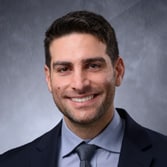Researcher Spotlight: Ajilan Al Zaki, MD, PhD
MD Anderson Cancer Center

Chimeric antigen receptor (CAR) T-cell therapies represent a meaningful treatment option for lymphoma, but many patients who receive these therapies will experience side effects caused by inflammation. In some cases, macrophage immune cells activated by CAR T-cells in the blood can migrate into the brain and cause neuroinflammation. Using novel imaging approaches, Dr. Al Zaki’s research aims to understand CAR T-cell-induced inflammation in the brain and how these effects can be inhibited in a mouse model. “Our hope is that this might help provide a deeper understanding to the mechanisms of toxicity and help identify new strategies for prevention or treatment, enabling more widespread adoption of current and emerging cellular based therapies,” he says.
Dr. Al Zaki earned his PhD from the University of Pennsylvania and his medical degree from George Washington School of Medicine and Health Sciences in Washington, DC. He is currently a hematology and oncology fellow at the University of Texas MD Anderson Cancer Center in Houston, TX. Dr. Al Zaki’s passion for understanding the neurotoxic effects of CAR T-cell therapies stems from personal experience, having had a close friend who was hospitalized with side effects from CAR T-cell therapy. “She shared with me how painful and frightening this experience was to her and her family,” he says. Dr. Al Zaki hopes to leverage his background in molecular imaging to help physicians and patients better understand these effects, in turn enabling more safe and effective use of these agents.
Looking ahead to the future, Dr. Al Zaki hopes to one day be managing his own laboratory as an independent physician scientist caring for patients with lymphoma and training future oncology researchers. He is excited about the future of immunotherapies such as CAR T-cells and antibody-based therapies and expects them to continue changing the landscape of lymphoma treatment. While he acknowledges that there is more work to do in the relapsed and refractory setting, Dr. Al Zaki sees this as an opportunity. “The silver lining is that we can continue to learn from this and build upon our knowledge to develop therapies that are more efficacious and less toxic, bringing us one step closer to finding cures,” he says.
Dr. Al Zaki is also a 2023 LRF Postdoctoral Fellowship Grant recipient for this research project.
